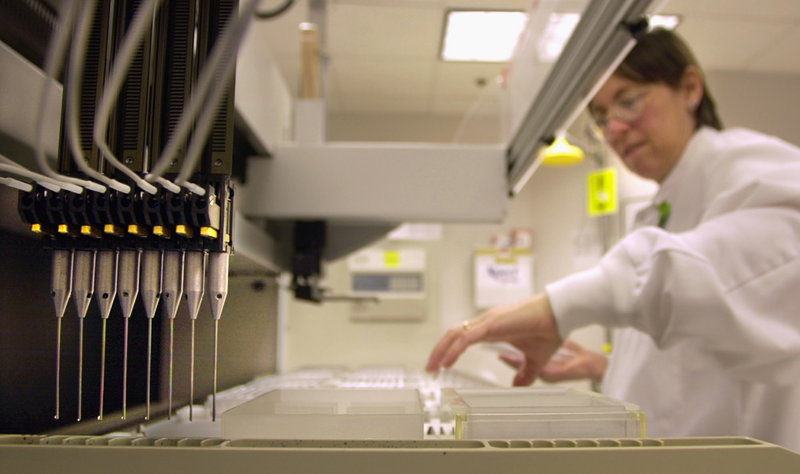WASHINGTON – The Supreme Court on Thursday unanimously threw out attempts to patent human genes, siding with advocates who say the multibillion-dollar biotechnology industry should not have exclusive control over genetic information found inside the human body.
But the high court also approved for the first time the patenting of synthetic DNA, handing a victory to researchers and companies looking to come up with ways to fight — and profit — from medical breakthroughs that could reverse life-threatening diseases such as breast or ovarian cancer.
The decision “sets a fair and level playing field for open and responsible use of genetic information,” said Dr. Robert B. Darnell, president and scientific director of the New York Genome Center.
“At the same time, it does not preclude the opportunity for innovation in the genetic world, and should be seen as an important clarifying moment for research and the health care industry,” he said.
The high court’s judgment, written by Justice Clarence Thomas, reverses three decades of patent awards by government officials and throws out patents held by Salt Lake City-based Myriad Genetics Inc. involving a breast cancer test brought into the public eye recently by actress Angelina Jolie’s revelation that she had a double mastectomy.
Jolie said she carries a defective BRCA1 gene that puts her at high risk of developing breast and ovarian cancers, and her doctor said the test that turned up the faulty gene link led Jolie to have both of her healthy breasts removed. Jolie’s mother died of ovarian cancer and her maternal grandmother also had the disease.
The high court’s ruling immediately prompted one of Myriad’s competitors to announce it would offer the same test at a far lower price.
Justice Clarence Thomas, who wrote the court’s decision, said Myriad’s assertion — that the DNA it isolated from the body for its proprietary breast and ovarian cancer tests were patentable — had to be dismissed because it violates patent rules.
The court has said that laws of nature, natural phenomena and abstract ideas are not patentable.
“We hold that a naturally occurring DNA segment is a product of nature and not patent eligible merely because it has been isolated,” Thomas said.
However, the court gave Myriad a partial victory, ruling that while naturally-occurring DNA was not patentable, synthetically-created DNA, known as cDNA, can be patented “because it is not naturally occurring,” as Thomas wrote.
The split decision mitigates potential damage to the multibillion-dollar biomedical and biotechnological industries in the U.S., experts said. It will affect companies like Myriad and others doing similar work, said Courtenay Brinckerhoff, a lawyer at Foley & Lardner.
“The decision is likely to have the greatest impact on diagnostic/genetic screening patents similar to those at issue in Myriad, but the ruling will impact the patent-eligibility of other newly discovered compounds that are ‘isolated’ from nature, such as medicinal compounds isolated from plants,” she said.
The U.S. Patent and Trademark Office has been awarding patents on human genes for almost 30 years, but opponents of Myriad Genetics Inc.’s patents on the two genes linked to increased risk of breast and ovarian cancer say such protection should not be given to something that can be found inside the human body.
The company used its patents to come up with its BRACAnalysis test, which looks for mutations on the breast cancer predisposition gene, or BRCA.
Women with a faulty gene have a three to seven times greater risk of developing breast cancer and also have a higher risk of ovarian cancer.
Myriad sells the only BRCA gene test, which costs around $3,000. Opponents said the company has used its patents to keep other researchers from working with the BRCA gene to develop other tests. The challenged patents would have expired in 2015.
“Today, the court struck down a major barrier to patient care and medical innovation,” said Sandra Park, a lawyer for the American Civil Liberties Union Women’s Rights Project.
“Myriad did not invent the BRCA genes and should not control them. Because of this ruling, patients will have greater access to genetic testing and scientists can engage in research on these genes without fear of being sued.”
Copy the Story Link
Send questions/comments to the editors.



Success. Please wait for the page to reload. If the page does not reload within 5 seconds, please refresh the page.
Enter your email and password to access comments.
Hi, to comment on stories you must . This profile is in addition to your subscription and website login.
Already have a commenting profile? .
Invalid username/password.
Please check your email to confirm and complete your registration.
Only subscribers are eligible to post comments. Please subscribe or login first for digital access. Here’s why.
Use the form below to reset your password. When you've submitted your account email, we will send an email with a reset code.